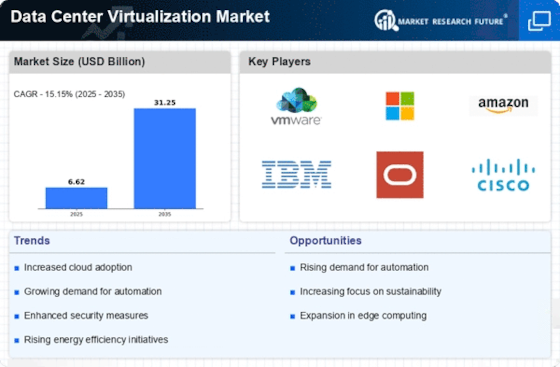Market Trends
Key Emerging Trends in the Data Center Virtualization Market
The market dynamics of Data Center Virtualization reflect a transformative shift in how organizations manage and optimize their IT infrastructure. Data Center Virtualization involves the creation of virtualized instances of servers, storage, and networking resources, allowing for greater efficiency, flexibility, and scalability in data center operations. One key driver of the market is the increasing demand for cost-effective solutions that maximize resource utilization. By consolidating physical hardware into virtual environments, organizations can achieve higher levels of efficiency, reducing the need for extensive physical infrastructure and minimizing operational costs.
The pursuit of agility and rapid scalability is another crucial factor shaping the dynamics of the Data Center Virtualization market. Virtualization technologies enable organizations to quickly adapt to changing workloads, allocate resources on-demand, and respond swiftly to business needs. This agility is particularly valuable in dynamic and fast-paced industries where the ability to scale infrastructure up or down in real-time is essential. As businesses embrace digital transformation, the demand for flexible and agile data center solutions continues to drive the adoption of virtualization.
Moreover, the increasing complexity of IT environments and the need for efficient resource management are fueling the growth of the Data Center Virtualization market. In traditional data centers, managing and provisioning physical servers, storage, and networking devices can be a time-consuming and complex task. Virtualization simplifies this process by abstracting the underlying hardware, allowing IT administrators to provision and manage resources through software interfaces. This abstraction layer enhances overall data center manageability and streamlines IT operations.
The trend towards cloud computing is influencing the dynamics of Data Center Virtualization. Cloud services often rely on virtualization technologies to deliver scalable and on-demand resources to users. As organizations adopt hybrid and multi-cloud strategies, data center virtualization becomes a key enabler for creating a seamless and integrated IT environment. The ability to extend virtualized workloads between on-premises data centers and public or private clouds enhances flexibility and optimizes resource utilization across different computing environments.
Security considerations play a significant role in shaping the dynamics of the Data Center Virtualization market. While virtualization brings numerous benefits, it also introduces new security challenges, such as the potential for lateral movement within virtualized environments. As a result, there is a growing focus on implementing robust security measures within virtualized data centers, including network segmentation, encryption, and advanced threat detection. Security concerns influence the choice of virtualization solutions and drive innovation in securing virtualized infrastructures.
Interoperability and compatibility are critical factors impacting the dynamics of the Data Center Virtualization market. Organizations often have existing investments in specific hardware, software, and infrastructure. Virtualization solutions that seamlessly integrate with existing IT environments, support multiple hypervisors, and provide interoperability with various applications become attractive options for businesses looking to modernize their data center operations without disrupting existing workflows.
The trend towards edge computing is also influencing the dynamics of Data Center Virtualization. As organizations deploy computing resources closer to the edge of the network to reduce latency and support emerging applications, virtualization becomes essential for managing and orchestrating distributed computing environments. Edge data centers leverage virtualization to efficiently allocate resources and ensure consistent performance across geographically dispersed locations.
The market dynamics are further shaped by the ongoing evolution of virtualization technologies. Innovations such as containerization and microservices architecture are gaining prominence, offering more lightweight and scalable alternatives to traditional virtual machines. These advancements contribute to the versatility and adaptability of data center virtualization solutions, enabling organizations to choose the approach that best aligns with their specific requirements.



















Leave a Comment